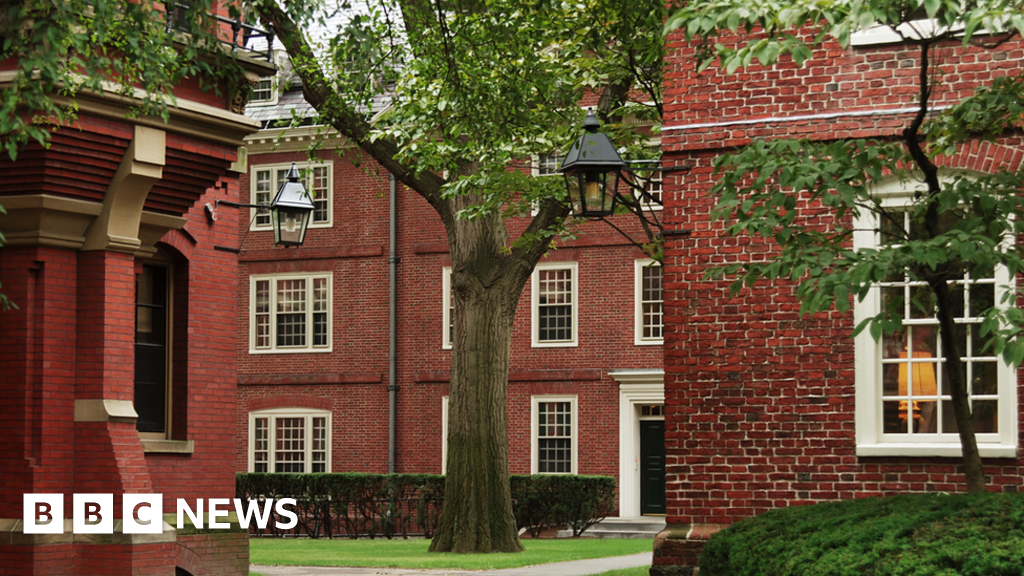- Joined
- Dec 6, 2010
- Messages
- 33,424
- Reaction score
- 5,686
Harvard under fire for helping elite skip the queue
By Robin Levinson King | 25th November 2023Harvard University is facing a crisis after a landmark court case exposed how it gives the relatives of alumni a leg-up. Its so-called legacy admissions policy is now in the crosshairs of lawmakers who say it perpetuates inequality.
For centuries, the streets of Harvard's red-bricked campus have borne the heels of America's future leaders, from Teddy Roosevelt to Mark Zuckerberg. The ability of the oldest university in the US to propel students into the upper echelons of politics, business and tech has made admission highly coveted. But the way it chooses who gets the golden ticket is being closely scrutinised.
Earlier this year, a landmark Supreme Court decision dismantled affirmative action, making it illegal for Harvard and other universities to give admission preference to under-represented minorities.
Harvard said the change would make it harder for it to recruit a diverse student body. But the court proceedings also blew open what many had long suspected - that the school gives preference to the children of alumni.
The policy, known as legacy admissions, is practised by dozens of elite American universities, including the eight schools in the Ivy League, as well as many other private and elite public universities. It means if a close relative attended that university then you might be preferred to an applicant of similar strength whose parents did not.
While most class privileges in US society are bestowed with a wink and a nod - it's all about who you know, what you wear, how you sound - the court case laid bare how institutions use legacy status to let some applicants skip the queue. And that has led many, from state legislators to Harvard students themselves, to call for the policy to end.
When Allison Hunter first found out she got into Harvard University, she didn't quite believe it.
"I never would have thought it would have been something that in my lifetime, I would have been able to accomplish," she said.
But a mentor convinced her to apply, and now she is the first person from her Atlanta high school to attend the hallowed institution.
"You have to think of yourself as capable," she reflected.
For years, the school had greatly amped up its efforts at inclusion. In 2023, the school charged $54,269 a year in tuition, but it is free to students whose families earn below $65,000, and families earning up to $150,000 pay no more than 10% of their income each year. The school has also increased the non-white and Hispanic students from 17% to over 50% of the student body over the past four decades.
Donyae Jenkins, another Harvard student, said that after the Supreme Court ruling, "a lot of black and brown students may feel that this is somewhere they don't deserve to be".
Both Allison and Donyae disagree with affirmative action being struck down, especially when legacy admissions live on because the policy tends to favour students who are well off and white. Documents filed in the Supreme Court case revealed that Harvard gives points to "ALDC" candidates, who are legacy applicants, athletes, relatives of donors, and children of faculty or staff. While only 5% of applications come from ALDC students, they make up about a third of acceptances. About 70% of those applicants were white.
"They [the children of alumni] are also getting what some may call special admission into the college," Donyae said.
That special advantage, data shows, is a rocketship into the stratosphere of America's elite.
A recent paper published by Opportunity Insights, a research group based out of Harvard University and Brown University, found that legacy applicants were four-times as likely as non-legacy applicants with the same test scores to be admitted.
The study looked at 15 years of admissions data at 12 private "Ivy-Plus" colleges (the eight colleges in the Ivy League, plus the University of Chicago, Duke, MIT, and Stanford).
When these same legacy students applied to other top universities where they did not have legacy status, that advantage disappeared, the study found.
Students who attended "Ivy Plus" colleges were 60% more likely to earn in the top 1% and three times more likely to work at prestigious employers in medicine, research, law, finance, and other fields compared with students who attended what they called "flagship" public universities.
"Students on these campuses today will be the leaders across a wide range of fields in society tomorrow," said John Friedman, a professor at Brown University (also part of the Ivy) who co-authored the research.
"If we want children from all backgrounds to feel like they have a shot at a trajectory to get to those leadership positions, we need these universities to be admitting students in a way that supports broader equality of opportunity."
Their findings are backed up by others. A 2019 study by the National Bureau of Economic Research found that 75% of white students who were recruited to Harvard as ALDCs "would have been rejected" if they had been treated as white students without those connections.
Many scholars have traced the roots of legacy admissions to the beginning of the 20th Century when universities wanted to keep their institutions beyond the reach of the country's growing immigrant population. While times have changed, and Harvard has made a commitment to greater diversity and equity, legacy admissions remain.
In defending the practice, the school said it "helps to cement strong bonds between the university and its alumni" that last a lifetime.
It also noted the "generous support" that alumni provide which helps make financial aid possible to increase diversity and excellence, the school wrote in a report released in 2018.
"Although alumni support Harvard for many reasons, the committee is concerned that eliminating any consideration of whether an applicant's parent attended Harvard or Radcliffe would diminish this vital sense of engagement and support."
That money is no small change. With an endowment of $50bn, Harvard has the largest university endowment in the world. Oxford and Cambridge, which do not practice legacy admissions, have endowments of about $7bn, respectively.
Harvard's deep pockets have helped it crown the country's elite, but some accuse it of using this power not to create a better society, but to maintain the status quo. And they say legacy admissions have got to go.
Massachusetts's state legislature is considering a bill that would levy a fee against the school and other schools that grant legacy admissions benefits.
"One of the things that binds Americans together, whether you're from Maine, Massachusetts, California, or Texas, is this idea of meritocracy," says the bill's co-sponsor, state Senator Pavel Payano, who was born in the Dominican Republic.
"These elite universities are essentially focused on having individuals that don't look like me, individuals that are not working-class people attend their school, and I don't think that's right."
Harvard is also now the subject of a civil-rights probe by the US Department of Education, after a lawsuit alleged the school gave overwhelming preference to white, wealthy students by prioritising legacy and donor applicants.
Michael Kippins, a litigation fellow at the legal non-profit Lawyers for Civil Rights that filed the lawsuit, told the BBC he thinks that the admissions policy is unjustified.
"They discriminate against applicants of colour, and there's a disproportionate impact on applicants of colour, that unjustly harms their chances of being admitted to Harvard," he said.
There are signs of a sea change. Wesleyan University and Amherst College, two elite private institutions, have both ended legacy admissions.
Harvard University President Claudine Gay has said that in light of the Supreme Court's decision on affirmative action, "everything was on the table".
"I can't, nor do I think it is actually productive to try to predict where that conversation is going to go," she told the Harvard Crimson, the student paper. "But I think it's a real signal of what a watershed moment we're facing in higher ed, that we're thinking and having conversations at this level of expansiveness."
The school did not respond to the BBC's repeated requests for comment.
On a recent visit to the campus, some students said the blowback against legacy admissions was overdone.
"I just think that they (legacy students) deserve a spot on this campus just as much as the rest of us," said Kennith Taukalo, who did not himself have legacy status.
But others did wonder if there was a better way.
"Other places in the world are still able to create that academic environment of excellence without this legacy admission," said Phd student Louise Rossetti, from the UK.
"I'm sure there's other ways in which funding could be brought to the university without creating shared disadvantage to students."

Harvard under fire for helping elite skip the queue
Children of past students are favoured in admissions - now state legislators are calling for this to end.
www.bbc.com



